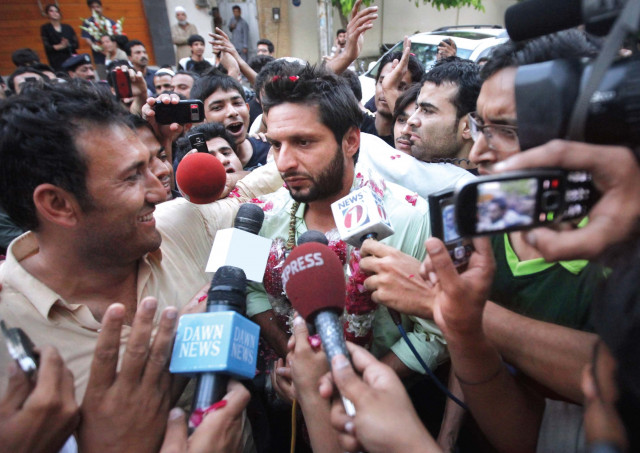Afridi’s political ‘no-ball’
Afridi should not have aired his own views, packaged with his completely gratuitous judgement of Indians as a people.

He also gave his audience the dubious satisfaction of hearing a piece of judgement directly out of Pakistan’s textbook indoctrination, something that his Indian counterpart MS Dhoni would never have done, given his better education: “If I have to tell the truth, Indians cannot have the kind of hearts that Pakistani Muslims have. They cannot have the big and clean hearts that Allah has given to Pakistanis”.
Notwithstanding his later remarks that his comments were taken out of context, what he said will greatly put off people on both sides of the border. Afridi opined: “It is very difficult for us to live with them or have a long-term relationship with them. You can see how many times we have had friendship in 60 years and how many times relations got strained”. He then made mincemeat of his earlier claim of being an ambassador of Pakistan by boasting that he knew what he was saying because of this special status.
How some Indian TV channels behaved during the World Cup is for others to judge. Their hate-laden ‘analysis’ was seen by viewers across the world, including in Pakistan. Mr Afridi should not have aired his own view of it, packaged with his completely gratuitous judgement of Indians as a people. What came out of his mouth was the brainwashing of India-haters who continue to block the road to peace in South Asia.
India and Pakistan have developed views of each other across decades of conflict. These are actually constructions of ‘the other’ that the world has learned to discount. Because of his preoccupation with his game, Mr Afridi was unaware that this mutually hostile rhetoric is taken outside South Asia with a pinch of salt, if not with ridicule. If he was trying to inform the world of any new discovery of India’s villainy, he should have saved his breath. If he was trying to inform Pakistanis of this villainy, he should also have saved his breath, because his cliché-ridden statement is already old hat in Pakistan.
Prime Ministers Manmohan Singh and Yousaf Raza Gilani knew exactly what the world outside South Asia thought of the bruising battle of words between India and Pakistan. Mr Singh invited Mr Gilani to the Mohali match knowing full well that the meeting will bring down the temperature raised in the past by the ‘ratings-seeking’ media on both sides. The world has not forgotten the India-Pakistan media war that took place after the 2008 terrorist attack in Mumbai. Later, the anchorpersons who had unleashed it were exposed as men and women of dubious ethics. The Pakistani captain got the significance of the word ‘ambassador’ wrong. Cricket players are pointedly called ‘ambassadors of peace’, not diplomats who often create bad blood where smoothing of the ruffled feathers is required. It is unfortunate that ambassadors exchanged between the two neighbours often represent hardline elements back home and end up perpetuating conflict. Skipper Afridi, one has to say regrettably, is perhaps one such ambassador.
The Pakistan Cricket Board (PCB) should reprimand Mr Afridi despite his popularity, because he has done the opposite of what the sport is meant to achieve. When the Olympic Games first began, they allowed competing nations to defuse their instinct for war and divert it to a more productive purpose. Athletes gathered in Athens from states often at war with each other, and the objective of the games was not to promote hostilities but to remove them through catharsis. What the Pakistani skipper has done tells us that the PCB continues to neglect its duty to educate its players in the decorum of the game. It needs to undertake this briefing, given the low level of education among our sportsmen.
Published in The Express Tribune, April 6th, 2011.















COMMENTS
Comments are moderated and generally will be posted if they are on-topic and not abusive.
For more information, please see our Comments FAQ